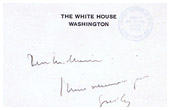Knowing that some missiles in Cuba were now operational, the president personally drafts a letter to Premier Khrushchev, again urging him to change the course of events. Meanwhile, Soviet freighters turn and head back to Europe. The Bucharest, carrying only petroleum products, is allowed through the quarantine line. U.N. Secretary General U Thant calls for a cooling off period, which is rejected by Kennedy because it would leave the missiles in place.
-
A copy of the handwritten draft of President Kennedy's letter to Khrushchev October 25, 1962.
-
New York Journal-American newspaper article describing U.S. Ambassador to the U.N Adlai Stevenson's confrontation with Soviet Ambassador Valerian Zorin.
Much public debate between the United States and the Soviet Union took place in the halls of the United Nations. During the debate in the Security Council, the normally courteous U.S. Ambassador Adlai Stevenson aggressively confronted his Soviet U.N. counterpart Valerian Zorin with photographic evidence of the missiles in Cuba.























